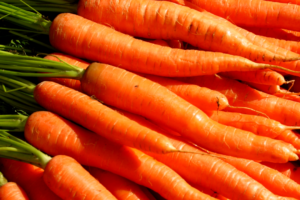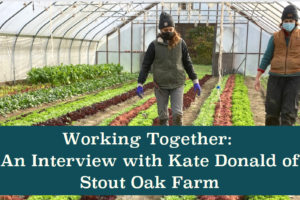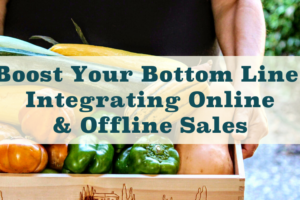
Photo courtesy Queen’s Greens
Located on 35 lush acres of Western Massachusetts farmland, Queen’s Greens is owned and operated by its founders, Danya Teitelbaum and Matt Biskup. They grow certified organic vegetables, and the farm is best known for what its name suggests: gourmet greens, sold solely through boutique wholesale outlets, restaurants, and institutions in New England and New York.
We were recently lucky enough to speak with Danya about Queen’s Greens, their relationship with LFM, competitive edge as a small farm, and the impact technology has had on their back-end farm operations. Read on to find out more about the opportunities streamlining paper work and implementing software can bring to small farm operations like Queen’s Greens.
LFM: Hello, Danya! Thank you for taking the time to talk with me. For those unfamiliar with your farm, could you briefly tell a little bit about yourself and the farm business?
DANYA: We grow about 35 acres of produce, majority of that being baby greens. We also grow tomatoes, culinary herbs, and root vegetables for the winter. We grow in over one acre of high tunnels, so we do provide greens throughout the winter.
Everything we sell is wholesale. Our outlets include boutique wholesale, restaurants, stores, and institutions around New England and New York.
LFM: Adopting software and new technologies can be challenging no matter the field. What was your document control like before LFM, and what made you choose LFM software for your farm?
DANYA: A few years ago, we began looking into software options for the farm. We heard about LFM, because one of our friends and neighbors (Kitchen Garden Farms) were using it. They were happy with it, and they jumped right in to utilizing the software.
Honestly, I was looking for any help I could get! Prior to LFM, I was just using Quickbooks and Excel, and I was taking all of my orders in over e-mail, phone, or text. I was inputting all orders into a spreadsheet. Then, out of the spreadsheet, I was making harvest lists and exporting the information. We were making all labels by hand. It was very time consuming.
For awhile I was trying to build my own thing using Google Forms, having it dump into a spreadsheet, but I needed more. I thought there wasn’t anything out there that could facilitate what we needed, until we contacted you! LFM was the only software out there that could do what we wanted: provide a customer interface, printable and automated invoices, a harvest list, labels, and more.
I use LFM for my whole business as a single farm, but I’m also part of the Three Rivers Farm Alliance as a producer with the foodhub. That makes me a dual user!
LFM: Your main sales’ outlets are restaurants and other institutions. How did they respond when you implemented LFM?
DANYA: A real mix! (Laughs) We’ve been using LFM for a couple years now, and not all our customers order directly through LFM. However, all our orders are inputted into the system. All the restaurants, small stores, co-ops, and groceries order directly themselves online. Although we aren’t perfect, ultimately, it’s still way easier than where we were prior to LFM.
For our customers that are using the software, they love it. Our customers that we have worked with over a long period of time have said that LFM makes it easier to order. They also love seeing the pictures! They love it. Our customers are extremely happy with the move.

LFM: What do you like most about LFM?
DANYA: What I like most about the LFM software is that it saves me time. What I definitely like most about the LFM company is that it is another small business I can support, where I can get Amy or Nick on the phone or by e-mail. It’s very personal.
LFM: Do you think using LFM software has given you a competitive edge in the industry?
DANYA: LFM makes us look a lot more professional to the customers logging in, so I think that is really helpful. I think LFM definitely saves me a ton of time every week. Anything that is saving me a ton of time adds to our competitive edge.
Our time is so valuable, and it can only be spread so thin. For me, to free up maybe 15 hours a week that I used to spend handling order stuff, that is really important. I can now put those 15 hours somewhere else.
The lot tracking module has been really important for our business. Any of the big companies, the larger retail outlets and institutions, require a level of food safety certification that incorporates lot tracking. Before LFM we couldn’t really handle that. Now it’s really easy for us to have a lot that is recorded in LFM, shows up on the invoice, and shows up on the label on the case. That has really been a competitive advantage in basically being a small farm trying to be competitive in a large marketplace.
LFM: What would you say to someone interested in pursuing LFM?
DANYA: Unless someone is doing some genius thing that I have not heard of, investing in LFM is totally worth it! Even if we were doing half the amount of wholesale we are doing now, or even less, it would still be 100% worth investing in. I just think that the time LFM has saved is invaluable.
Register for a Demo Today!



